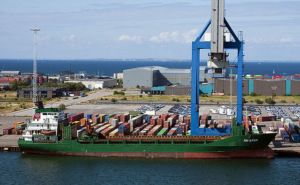News
We’ve got self-driving cars, now Denmark wants self-driving ships
This article is more than 8 years old.
Ships might soon be plying Danish waters with hardly anyone aboard, steered by automated systems from ashore

The next one in port might be self-driving (photo: CGP Grey)
If the minister of industry, business and financial affairs, Brian Mikkelsen, has his way, Denmark will be in the forefront of developing technology for self-driving – or autonomous – ships.
Mikkelsen wants to amend existing legislation to permit remote and autonomous ships to enter Danish waters. According to the minister, this is to reduce the number of accidents at sea.
READ ALSO: Local News in Brief: Driverless cars heading to Nordhavn?
The concept is not new. Rolls Royce, for example, has been working on it for some time.
“This is happening. It’s not if, it’s when. The technologies needed to make remote and autonomous ships a reality exist. We will see a remote controlled ship in commercial use by the end of the decade,” Oskar Levander, the vice president of innovation – marine at Rolls Royce, said at a symposium in Amsterdam in 2016.
The ‘hands-off approach’ is thought to be safer
According to a report written by DTU, autonomous ships have the potential to be safer than ships steered by humans.
Accident statistics from the European Maritime Safety Agency for the period 2011-2016 show that human error was the reason for 62 percent of accidents involving EU-registered ships.
And there are good reasons to believe that the figure is much higher on a worldwide basis, as European ships have some of the best navigators on board, professor Mogens Blanke of DTU, one of the writers of the report, told DR Nyheder.
Autonomous systems can potentially significantly reduce the number of accidents because, with the help of advanced technology, they can help today’s small crews make better decisions.
READ MORE: Israeli startup deal proves Denmark is on the right track with self-driving cars
More than one man and his dog
Even though automation makes it possible to reduce crew numbers, the ships would not be 100 percent automatic. There will still be crew members on board, or in some cases, they can be steered from land if necessary.
“We’re talking about varying degrees of automation – from steering a course and plotting a route using autopilot at the lowest level, to help in decision-making for navigators in the middle, to unmanned voyages at the highest level. It would only be in the latter case that all the navigational decisions would be made by a computer,” Blanke told DR Nyheder.
He went on to say that 100 percent autonomy would only be relevant for very few vessels. The majority would have algorithms that didn’t make important decisions themselves, but instead, supported human crew members in making the best decisions.
READ MORE: Self-driving cars could actually increase congestion on Danish roads
Not just plain sailing
In this context, perhaps, it would be wise to bear in mind the teething troubles that widespread implementation of electronic navigation systems (ECDIS) had to start with – especially when combined with severely reduced manning levels. These have still not been entirely resolved.
As the ECDIS website makes clear, everyone agrees that it is vital to ensure that crews are properly trained to use the equipment. The same applies to autonomous ship systems – when they come.










































